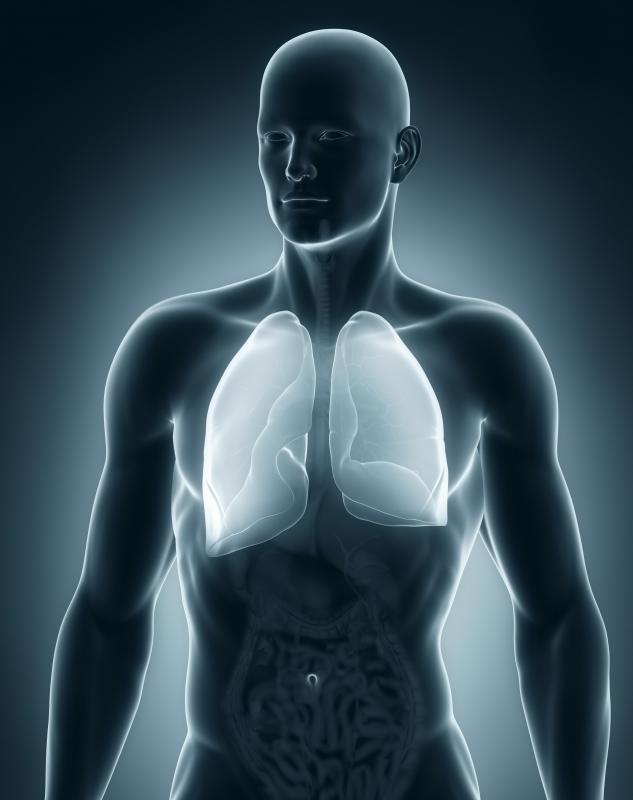At TheHealthBoard, we're committed to delivering accurate, trustworthy information. Our expert-authored content is rigorously fact-checked and sourced from credible authorities. Discover how we uphold the highest standards in providing you with reliable knowledge.
What is Radiation Fibrosis?
Radiation fibrosis is a side effect of radiation treatment which is characterized by scarring and hardening of tissue inside the body or on the skin. This side effect can appear in a number of different locations, and may cause additional complications for the patient, depending on where it manifests. While radiation fibrosis cannot be cured or resolved, there are treatments which can be used to manage it, and there are also some steps which can be taken to reduce the risk that it will develop. This condition most commonly occurs in the wake of radiation treatment for cancer.
It is believed that radiation fibrosis is probably closely linked with lymphedema, which can cause permanent damage to body tissues. Consistent inflammation and irritation leads to scarring and hardening over time, which in turn makes it more difficult for lymph to circulate, and can cause the lymphedema and fibrosis to spread. Radiation fibrosis can appear weeks or months after radiation therapy, and may grow worse over time.

On areas like the skin, fibrosis can be a cosmetic issue because it makes the skin look unsightly. In addition, it may restrict freedom of movement because the scarred skin is usually stiff and tough. Radiation fibrosis on the neck, for example, might make it hard for a patient to turn her or his head, because the scarring pulls at the neck. Fibrosis can also occur in internal organs such as the lungs, in which case it may cause secondary complications such as difficulty breathing and susceptibility to infection in the future as a result of the compromised tissue.

Being aware of the risks of radiation fibrosis from the start of radiation therapy is important. Patients should report changes they experience promptly, and they should be monitored throughout treatment for signs of complications and dangerous side effects. Sometimes early intervention can limit side effects, as for example when specialized massage is used to treat lymphedema, preventing scarring by moving lymph through the body instead of allowing it to accumulate and cause inflammation.

Some medications may also be helpful for people with radiation fibrosis. In the case of scarring on the skin, gentle stretching, massage, and other exercises can promote freedom of movement or help patients retain their current freedom of movement. Radiation-induced fibrosis inside the body is treated on a case by case basis, depending on the nature of the damage, and medical imaging studies of the involved area may be required in order to develop a treatment plan.
AS FEATURED ON:
AS FEATURED ON:
















Discussion Comments
My mom was diagnosed with lung cancer two years ago. She went through radiation and developed radiation induced fibrosis in her lungs. Now she has shortness of breath which she is on oxygen for and also has a really bad cough. had Had doctors discussed this side effect with us we could have tried to prevent it.
I know my mom suffers every day with this horrible cough. Does anyone have any suggestions on what to give her to make the cough not so bad?
My husband has radiation pneumontis. He started his radiation treatments in Janury, by March they took a CT scan and he already had radiation pneumontis. We cannot recall the doctors discussing this horrible side effect with us.
@StarJo - The only treatment he received was the steroid drug Prednisone. Unfortunately, this drug can also weaken the immune system, and because of that, he developed a bad case of pneumonia.
However, your friend has more hope than he had. He had already developed radiation fibrosis, which is generally permanent and irreversible. Radiation pneumonitis is reversible with cortisone drugs that decrease inflammation.
Tell your friend she definitely needs to get a second opinion. She shouldn’t have been told that she would die with that condition when there are medications to reverse it on the market.
@wavy58 - Sorry about your great uncle. My best friend also has radiation pneumonitis. She was told that she might have it until she dies.
What type of treatment did he receive for the radiation pneumonitis? Did the doctors tell him that it would likely be incurable? I would like to know if there is any treatment that we don’t already know about so my friend could get some relief. She can barely go from one room to the next without struggling for breath for quite awhile afterward.
My great-uncle developed radiation fibrosis as a result of radiation pneumonitis. His lungs became inflamed because of the radiation therapy.
Radiation pneumonitis appeared about 3 months after he had finished radiation therapy. He knew something was wrong because he got out of breath very easily when doing small, easy chores. He developed a cough and a fever, and my great-aunt made him go to the hospital. They x-rayed his chest and found the radiation pneumonitis.
The radiation pneumonitis persisted even though he got treatment. After about a year, it caused him to develop radiation fibrosis.
Post your comments